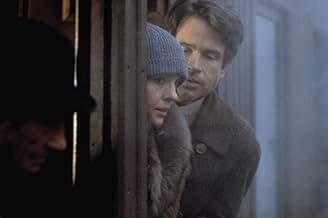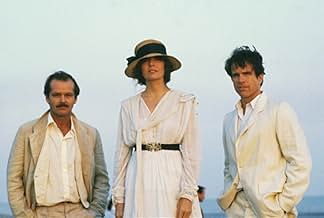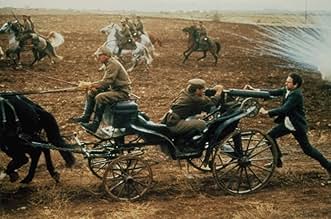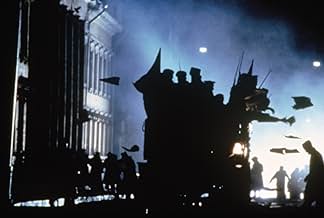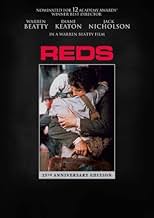Ein radikaler amerikanischer Journalist kommt mit der kommunistischen Revolution in Russland in Berührung und hofft, ihren Geist und Idealismus in die Vereinigten Staaten bringen zu können.Ein radikaler amerikanischer Journalist kommt mit der kommunistischen Revolution in Russland in Berührung und hofft, ihren Geist und Idealismus in die Vereinigten Staaten bringen zu können.Ein radikaler amerikanischer Journalist kommt mit der kommunistischen Revolution in Russland in Berührung und hofft, ihren Geist und Idealismus in die Vereinigten Staaten bringen zu können.
- Regie
- Drehbuch
- Hauptbesetzung
- 3 Oscars gewonnen
- 22 Gewinne & 37 Nominierungen insgesamt
- Mrs. Reed
- (as Eleanor D. Wilson)
Empfohlene Bewertungen
Technically, the movie is beautiful to look at, well written and well acted. It has a lot of great professional actors in it, and lots of the people who were actually there at the time this part of our history was being made. The "witnesses" device works well for Warren Beatty who as a director and writer always seems to include the easily overlooked details of the stories in most of his films. He is also at his fumbling best as John Reed, whose 10 Days That Shook The World fell into well-deserved obscurity probably almost as soon as it was written. That this great historical perspective could rise out of that is truly a testimony to Beatty's talent.
There are many great acting performances in this film, including one of Jack Nicholson's very best as Eugene O'Neil, as well as those of Paul Sorvino, Gene Hackman and George Plimpton who demonstrate the range of persons who touched Jack Reed's life. Jerzy Kozinsky is riveting as Zinoviev.
If one likes historically based dramas, this one should leave you breathless, and will probably leave you wanting to watch it more than once, just to make sure you don't miss any of the details.
10 Stars, Absolutely.
I suppose you'll either like it or loathe it. If you like it, good; it isn't a bad film, but a bit of an idea of European history will help you.
If you you fall into the latter category loathe it because you think it's a bad film not because of the stupid bigotry shown in some of the other reviews here which seem to be so hung up on the USA and Mom and apple pie that they see "Commies" in even thinking about the event of the early 20th century!
After seeing it it made me interested enough to find out about John Reed. You might not like what he thought, you might not like Warren Beatty and what he thinks but for heaven's sake don't rubbish this film simply because it's about a political system you may not like, or have been indoctrinated not to like!
It's not brilliant but neither is it a "love poem to communism".
Lenin's quote came to mind when I was watching one of the most spellbinding movies to come along in years,and not since David Lean's brilliant 1965 epic classic "Doctor Zhivago" hasn't been a movie in recent memory that has come close. That motion picture is "Reds",released in 1981 by Paramount Pictures. The film was Warren Beatty's peeve project which he served not only as it star,but also the co-writer and direction. Director Warren Beatty's epic love story about American writers John Reed and Louise Bryant,set amid of the turbulence of American politics in the 1910's World War I and the Russian revolution that set this movie into plain focus. The movie itself is astounding to behold and is a tragic love story between the writers John Reed(Warren Beatty),and Louise Bryant(Diane Keaton). But it creatively used artsy,radical Greenwich Village in the 1910's-and such as real-life characters as playwright Eugene O'Neill(Jack Nicholson),and anarchist activist Emma Goldman(Maureen Stapleton)-as well as the drama of the Russian Revolution and the subsequent civil war as the principal landscapes in which their relationship plays out.
Director Beatty also made creative use of on-camera "testimony" by the likes of novelists Henry Miller and Rebecca West,Republican politician Hamilton Fish,comic George Jessel and civil libertarian Roger Baldwin. These senior citizens recall,with varying degrees of historical accuracy,Reed,Bryant and the times in which they lived. "Reds" shows convincingly that many of the contemporary issues in politics and culture have their antecendents in the first debates of the 20th century. Debates over birth control and abortion,marriage and commitment,public life versus private life,revolution versus reform are given full expression from varying viewpoints throughout the lengthy film(which runs over three hours). To Beatty's credit,his film captures the excitement the Bolshevik revolution stirred,both inside and outside Russia while revealing how the Bolshevik leadership quickly began to suppressing dissent within the revolutionary ranks on the way to becoming a dictatorship with a country that is in constant turmoil. Beatty's efforts certainly paid off artistically,bringing him prestige to him and Paramount making "Reds" a huge box office success for the studio when it premiered in theatres around Christmas of 1981.
"Reds" became one of the top highest grossing pictures of that year,and it paid off in high standards too. "Reds",which received 12 Academy Award nominations including Best Picture,lost an upset to Hugh Hudson's "Chariots Of Fire" in the Best Picture category. However it won three Oscars for Best Director(Warren Beatty),Best Supporting Actress(Maureen Stapleton),and Best Cimematopgraphy(Vittorio Storaro). Eventually,"Reds" made more than $40 million at the domestic box office,and once international figures were added in,it became one of the top grossing films of the 1980's. A feat Warren Beatty is still proud of to this day.
The film also sort of puts forward the question, "What if, instead of running back to Russia (to die of kidney failure and mistreatment by the CP), Jack Reed had stayed in this country to build the CP? Would it have turned out to become Stalinist?" According to Howe and Coser, who wrote a good book on THE AMERICAN COMMUNIST PARTY, much like Rosa Luxemburg and Karl Liebknecht in Germany, Reed was the ONLY leader who was independent, who had some real backbone.
The best part of the movie is when Emma Goldmann, played by Maureen Stapleton, tells Jack that "it doesn't work" (i.e. statist, bureaucratic socialism that the Bolsheviks were instituting as a grossly mistaken response to the economic crisis and Allied invasion of Russia after the Revolution). And then his rebellion against the lying propaganda of Zinoviev. Kind of hits me right now that Jerzy Kosinski should play Zinoviev--didn't he commit suicide when he was exposed as a plagiarist? Where is the line between art and reality, politics and life?
Of course I loved the romantic reality between Beatty, Bryant, and Nicholson (Reed, Bryant, and Eugene O'Neill). And the cynicism that Reed expresses about the Democrats and Wilson is certainly apropos today.
This film feels like a cross between David Lean ('Dr Zhivago' & 'Lawrence of Arabia' from his oeuvre) and Oliver Stone (in 'Nixon' mode). As with 'Bonnie & Clyde' the right music has been picked for the soundtrack- 'The Internationale' & Keaton's take of '...In my Yard' standout (though the score is taken from Sondheim, with contributions by 'Graduate'-composer Dave Gruisin). The film is brilliantly shot by the great Vittorio Storaro- who uses the same huge talent as he did on Bertolucci's 'Il Conformista' & Coppola's 'Apocalypse Now Redux'. Trevor Griffiths co-wrote this film- though there were contributions from a variety of historians- most notably Robert Rosenstone.
Fans of the film should consult Rosenstone's biography of John Reed ('Romantic Revolutionary') and his chapter on his involvement with and objections to elements in 'Reds' in the book 'Visions of the Past'. This Biopic is an interpretation of a life- as with films like 'Patton' it takes a rather small period of the protaganists total life experience- running from roughly 1914 to Reed's death from typhus in 1920. The film charts Reed's major experiences- his coverage of the First World War and the Mexican War of 1916 is shown- though the major achievments are his ventures into the complexities of American Socialism and American-Communism and his eventual experience in Russia/Soviet Union. The main aspect, the stalwart element throughout the film is his love affair with Louise Bryant- which is where the film begins and ends. Rosenstone believes this may have been a concession to Hollywood audience- but I think it puts the human and greater-backdrop into context.
'Visions of the Past' censures much of Beatty's "twists of truth" and the filmic conventions of compression and dramatic-symbolistic interpretation. This is not a documentary and this is not the actual John Reed. This is a biopic film, starring Warren Beatty playing 'John Reed'. If you want to read about the real thing- try 'Romantic Revolutionary' and Reed's masterpiece 'Ten Days That Shook the World' (which, ironically, came in for criticism regarding Reed's fictionalisation of the events of the Russian Revolution!- see the introduction to the Penguin edition by AJP Taylor). Remember historians have a vested interest in their interpretation- which by placing into lineal order in a history (non-fiction) book they are placing into a narrative form.
Beatty and Keaton are great in this film- with brilliant support from Gene Hackman,Jack Nicholson, Paul Sorvino & Maureen Stapleton. We see the John Reed on-screen move from Jack Reed journalist to John Reed idealist- the only American to be buried within the walls of the Kremlin.
Various anti-commies have objected to this film as it depicts Communism- well, at the time, this development from Marx/Engels 1848 Manifesto seemed liberating. Many intellectuals pondered on a new collective, non-Capitalist world- which was sadly a utopia that was unattainable. The Russian experiment failed- Beatty alludes to the flaws and Stalinism in the speech which the Party retranslate towards their own ends towards the end of the film. The Russian Revolution was an ideal- the workers of the world uniting- which considering the treatement meted out by the likes of Henry Ford was a good thing. This message is still relevant- as 'free market Capitalism' means market dominance for Superpowers, poverty for others- the persistence of a constant underclass and the eradication of Union Rights. There are as many flawed ethics to Capitalism as Communism- the arms trade (Reagan/Bush to Hussain, the US-sponsored coup in Chile-Cambodia-El Salvador- a policy which continues up to the failed one last week in Venezuala). Beatty takes the socialist ideals which 'Shampoo' alluded to and which he continued in the satirical 'Bulworth'.
Unlike Attenborough's 'Gandhi', this is not a biopic that is too reverent to its focus- many times Reed is shown to be a clown and it is Bryant's character who undergoes the vaster change- giving this film a strong feminist element. The other stroke of genius is the use of the witnesses- who provide a commentary on the film that sometimes contradict each other- alluding to a multiplicity of truths that overlap (as with Stone's alternate scenarios in 'JFK' & 'Nixon'- they themselves are not true but point out that the truth is relative and the accepted historist take may not be any more "real").
The Oscar people exhibited their usual poor taste again- choosing the yawnworthy 'Chariots of Fire' over this for best picture (well, the year before they chose 'Ordinary People' over 'Raging Bull'- and to this day mediocrity wins that coveted award: 'Forrest Gump', 'Schindler's List', 'Gladiator', 'Braveheart', 'Titanic'). This film has an epic scope- that the worthy Oscar winner 'The English Patient' also exhibited- though both show influence from David Lean. This was a time when Hollywood had ambition and made some great films that may not have set the box-office on fire a la 'Jaws' or 'Star Wars' but made some great works for posterity: 'The Deer Hunter', 'New York New York', 'Raging Bull', 'Heavens Gate' and this. 'Reds' is a masterpiece that should be seen by everyone and desrves to take its place alongside classic works by directors such as John Ford, Howard Hawks and Orson Welles.
Wusstest du schon
- WissenswertesReportedly, Warren Beatty reshot some scenes up to 35 times. Paul Sorvino said he did as many as 70 takes for one scene, and Maureen Stapleton said she did as many as 80 takes for another. Reportedly, of this, she famously once said to Warren Beatty, "Are you out of your fucking mind?" This earned her a round of applause from the crew.
- PatzerThe Finnish doctor tells Reed that his blood pressure is too high, but at that time, hypertension was not considered a problem by most doctors, who did not even consider treating it. Not until the mid-'40s did doctors begin to understand the dangers of high blood pressure.
- Zitate
Eugene O'Neill: If you were mine, I wouldn't share you with anybody or anything. It'd be just you and me. We'd be the center of it all. I know it would feel a lot more like love than being left alone with your work.
- Crazy CreditsAs the credits roll, additional interviews with the 'witnesses' play.
- Alternative VersionenThree seconds of horse falls were cut from the British version. The DVD supplements showing these shots are also cut in England.
- VerbindungenFeatured in Sneak Previews: Rollover, Quartet, My Dinner with Andre, Reds (1981)
- SoundtracksYou're a Grand Old Flag
Written by George M. Cohan
Top-Auswahl
Details
- Erscheinungsdatum
- Herkunftsland
- Sprachen
- Auch bekannt als
- Reds
- Drehorte
- Senate Square, Helsinki, Finnland(on location)
- Produktionsfirmen
- Weitere beteiligte Unternehmen bei IMDbPro anzeigen
Box Office
- Budget
- 32.000.000 $ (geschätzt)
- Bruttoertrag in den USA und Kanada
- 40.382.659 $
- Eröffnungswochenende in den USA und in Kanada
- 2.325.029 $
- 6. Dez. 1981
- Weltweiter Bruttoertrag
- 40.382.788 $
Zu dieser Seite beitragen



